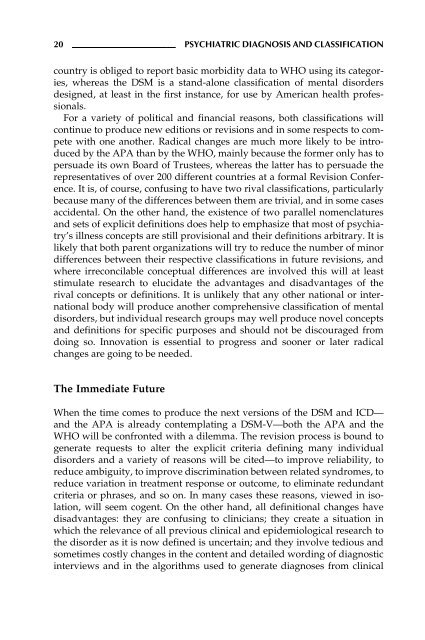Psychiatric Diagnosis and Classification - ResearchGate
Psychiatric Diagnosis and Classification - ResearchGate
Psychiatric Diagnosis and Classification - ResearchGate
You also want an ePaper? Increase the reach of your titles
YUMPU automatically turns print PDFs into web optimized ePapers that Google loves.
20 PSYCHIATRIC DIAGNOSIS AND CLASSIFICATION<br />
country is obliged to report basic morbidity data to WHO using its categories,<br />
whereas the DSM is a st<strong>and</strong>-alone classification of mental disorders<br />
designed, at least in the first instance, for use by American health professionals.<br />
For a variety of political <strong>and</strong> financial reasons, both classifications will<br />
continue to produce new editions or revisions <strong>and</strong> in some respects to compete<br />
with one another. Radical changes are much more likely to be introduced<br />
by the APA than by the WHO, mainly because the former only has to<br />
persuade its own Board of Trustees, whereas the latter has to persuade the<br />
representatives of over 200 different countries at a formal Revision Conference.<br />
It is, of course, confusing to have two rival classifications, particularly<br />
because many of the differences between them are trivial, <strong>and</strong> in some cases<br />
accidental. On the other h<strong>and</strong>, the existence of two parallel nomenclatures<br />
<strong>and</strong> sets of explicit definitions does help to emphasize that most of psychiatry's<br />
illness concepts are still provisional <strong>and</strong> their definitions arbitrary. It is<br />
likely that both parent organizations will try to reduce the number of minor<br />
differences between their respective classifications in future revisions, <strong>and</strong><br />
where irreconcilable conceptual differences are involved this will at least<br />
stimulate research to elucidate the advantages <strong>and</strong> disadvantages of the<br />
rival concepts or definitions. It is unlikely that any other national or international<br />
body will produce another comprehensive classification of mental<br />
disorders, but individual research groups may well produce novel concepts<br />
<strong>and</strong> definitions for specific purposes <strong>and</strong> should not be discouraged from<br />
doing so. Innovation is essential to progress <strong>and</strong> sooner or later radical<br />
changes are going to be needed.<br />
The Immediate Future<br />
When the time comes to produce the next versions of the DSM <strong>and</strong> ICDÐ<br />
<strong>and</strong> the APA is already contemplating a DSM-VÐboth the APA <strong>and</strong> the<br />
WHO will be confronted with a dilemma. The revision process is bound to<br />
generate requests to alter the explicit criteria defining many individual<br />
disorders <strong>and</strong> a variety of reasons will be citedÐto improve reliability, to<br />
reduce ambiguity, to improve discrimination between related syndromes, to<br />
reduce variation in treatment response or outcome, to eliminate redundant<br />
criteria or phrases, <strong>and</strong> so on. In many cases these reasons, viewed in isolation,<br />
will seem cogent. On the other h<strong>and</strong>, all definitional changes have<br />
disadvantages: they are confusing to clinicians; they create a situation in<br />
which the relevance of all previous clinical <strong>and</strong> epidemiological research to<br />
the disorder as it is now defined is uncertain; <strong>and</strong> they involve tedious <strong>and</strong><br />
sometimes costly changes in the content <strong>and</strong> detailed wording of diagnostic<br />
interviews <strong>and</strong> in the algorithms used to generate diagnoses from clinical

















